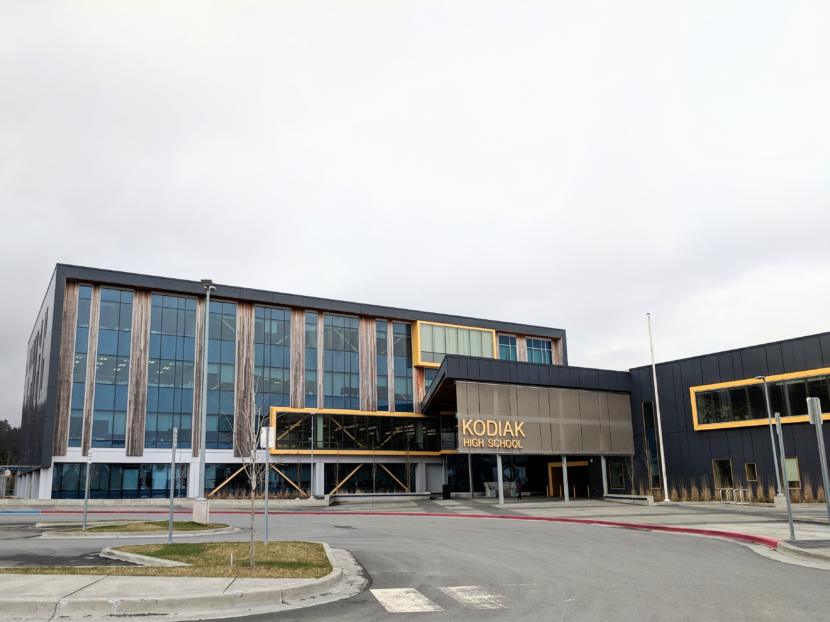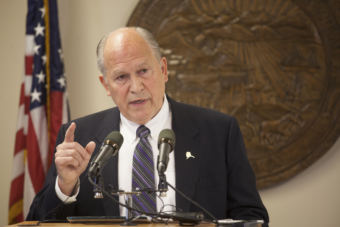
The recent House Finance Committee vote to end school bond debt reimbursement could have major implications for property owners in some municipalities.
In Kodiak, the reimbursement program provides state assistance to the local borough to pay off debts associated with school building expenses. Without it, the island is looking at shouldering that outstanding debt alone.
Kodiak Island Borough currently has $89,500,000 in outstanding school bond debt. That’s split over 11 series dating back to 2004.
Each series of bonds was approved by borough voters and by the state of Alaska to fund a number of school district projects over the years, including building Kodiak High School and getting regular maintenance and repairs done.
According to the reimbursement agreements, the state signed on to cover 60%-70% of each bond series. That’s a significant chunk when you consider that a single series might be $10 million. Without the program, the state passes that expense to the borough — and in Kodiak’s case, quite likely to property owners.
If the amendment to end the reimbursement program makes it into the final state budget, the borough is looking at shouldering $5.2 million of additional debt payments for the 2019 fiscal year. That’s on top of the $2.5 million it’s already paying using borough property taxes.
“If in fact funding for that whole program is cut, there’s not particularly a whole lot of options,” said Borough Mayor Dan Rohrer. “The borough assembly would need to decide what to do, but there’s not a tremendous amount of options in front of them, given that the borough’s general fund budget is $6.7 million. ($5.2 million) is not something we can just cut out of our general fund.”
And that has Kodiak residents concerned about major property tax hikes.
“You raised something like $14 million in property taxes last year. You’re not just going to raise property taxes, what, 38% to come up with another $5 million?” longtime Kodiak resident and former assembly member Mel Stephens said at last week’s assembly meeting. “It’s a big, big deal.”
Rohrer estimates that to cover the additional $5.2 million through property taxes alone, the borough would have to raise the rate four mills, or approximately 37%. On a $300,000 house, that would translate to a $1,200 tax hike. While the decision would ultimately be up to the assembly, it’s important to note that there is no set limit to the mill rate for taxes being collected for school bond debt.
While the state did commit to paying its share when each bond series was established, it’s actually not under any kind of legal obligation to continue doing so. And that’s something that was made clear to voters when they approved each series, Rohrer said.

Two years ago, he remembers, then-Gov. Bill Walker opted to cut 25% from the pool of reimbursement money.
“That year what we did was, we basically worked really, really, really hard to cut borough budget and not change the borough property tax rate at all,” he said.
But with that exception, Rohrer said voters were generally willing to go along with the reimbursement program, because the state had been consistently paying its share over the years.
“You gotta remember, historically the program has been 100% funded with the exception of the one time from Gov. Walker. So you know, I think people relied really heavily on the past actions of the Legislature to fund commitments they had made to the public.”
Assembly members at last week’s regular meeting expressed their deep concern at the prospect of paying off school bond debts without help from the state. In her comments, assembly member Julie Kavanaugh said she was concerned from the start that projects like the new high school weren’t guaranteed state funding.
“Unfortunately that’s come true. Now we’re faced with the reality of people thinking that money was gonna be there, that it was promised to us,” Kavanaugh said. “But it was only promised for a short period of time.”
Rohrer said both he and Kodiak City Mayor Pat Branson are willing to go to Juneau to argue their case for continuing the reimbursement program. With or without it, he added, the borough’s school bond debt is scheduled to be paid off by 2036.
